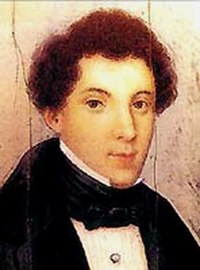The Spanish Mozart
 The Spanish composer Juan Crisóstomo Jacobo Antonio de Arriaga y Balzola, has been nicknamed the Spanish Mozart for several reasons. He and Mozart both had the same two first Christian names: Juan Crisóstomo - Johannes Chrysostomus (Mozart’s full name was Johannes Chrysostomus Wolfgangus Theofilus Mozart). They were both born on 27th January, albeit Mozart 50 years before Arriaga. They were both child prodigies with an innate musical talent - and they both died young.
The Spanish composer Juan Crisóstomo Jacobo Antonio de Arriaga y Balzola, has been nicknamed the Spanish Mozart for several reasons. He and Mozart both had the same two first Christian names: Juan Crisóstomo - Johannes Chrysostomus (Mozart’s full name was Johannes Chrysostomus Wolfgangus Theofilus Mozart). They were both born on 27th January, albeit Mozart 50 years before Arriaga. They were both child prodigies with an innate musical talent - and they both died young.
Arriaga was born in Bilbao in 1806, son of a professional organist who instructed his son from an early age in the marvels of music. Juan Crisóstomo soon became a prodigious violin and composing virtuoso. He was only 11 when he composed his first piece with the title ‘Nada y Mucho’, and two years later he had turned out his first opera ‘The Happy Slaves’, which was performed for the first time in his native Bilbao in 1820.
This made his father decide to send him to Paris to finish his musical studies at the ‘École Royale de Musique et Déclacamation’. Juan Crisóstomo moved to the French capital in 1821 at the tender age of 15.
His teachers at the conservatory, who were accomplished and recognised musicians in their own right, marvelled at his fast progress and his talent, especially for composing. In 1823, when the newly appointed director of the conservatory heard the young composer’s version of ‘Stabat Mater’, he exclaimed, ‘Incredible! This youth is music personified!’
In 1824, Arriaga was appointed assistant teacher of counterpoint and fugue to his own instructor having only the year before been a student himself in the selfsame lecture hail. This quickly turned him into a great favourite of both students and teachers from all over the conservatory.
Throughout his five year stay in Paris, Juan Crisóstomo composed tirelessly, producing works for piano and quartets as well as arias for singers and orchestras; he also composed a symphony for a great orchestra.
One of the things that impressed his teachers most was his use of harmonies, counterpoints and other sophisticated techniques that nobody had taught him, but which simply came to him naturally.
Sadly, Juan Crisóstomo was not to live to see his 20th birthday. He contracted a chest complaint, possibly tuberculosis, and this combined with the intense fatigue he suffered from his large work burden, ended his life on January 16th 1826, just 10 days before his 20th birthday.
Having listened to some of his marvellous works, one can only wonder what incredible music the world missed out on with the untimely demise of this music genius.

